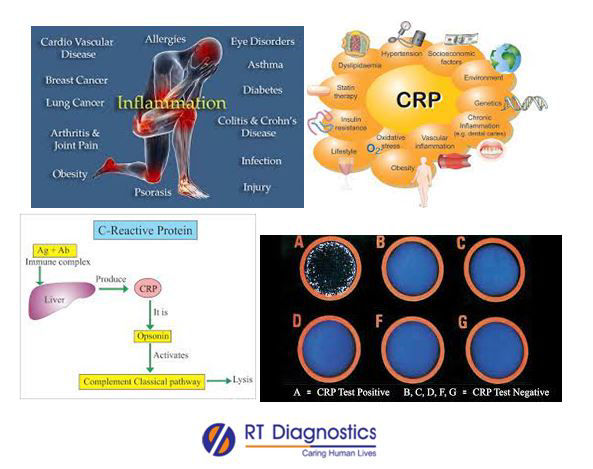C - reactive protein:
Why C – Reactive Protein Test?
CLINICAL INFORMATION
C – Reactive Protein (CRP) is an annular (ring-shaped) pentameric protein found in the blood plasma in response to inflammation, thus activating the complement system, promoting phagocytosis by macrophage and thereby eliminating necrotic and apoptotic cells and bacteria, etc. CRP is an acute-phase protein, synthesized by the liver to organize the body’s defense system, in response during an active ongoing infection eg. Capsular (C-polysaccharide) Polysaccharide of pneumococcus and/or any time-bound inflammatory process (acute, current, or chronic inflammation). CRP is measured as a marker for inflammation eg. as a part of the body’s defense/immune system to fight against illness or injuries, thus protecting the body tissues from further insult. The elevated levels of CRP during an underlying pathology triggers a further cascade of physiologically significant events thus mediating activation of inflammatory factors, cytokines (like interleukin-6), recruitment of circulatory inflammatory cells (macrophage, T-cells, etc), prevention of normal cells from infected host cells (i.e dead host cell by infection due to apoptosis or dying cells due to infection eg T-helper cell infected by HIV virus in AIDS), engagement of tissue repair, etc. Therefore the physiological role of CRP is to bind to lysophosphatidylcholine expressed on the surface of dead or dying cells (and some type of bacteria) in order to activate the complement system –via C1q. This CRP blood test is ordered in patients suspected of infection manifested with symptoms (presenting with cardinal signs of inflammation like – rubor, tumor, calor, dolor, and loss of function) such as fever, chills, redness, nausea, vomiting, rapid breathing, rapid heart rate, etc. C – Reactive Protein test helps to screen for diagnosis of inflammation, autoimmune diseases (monitor flare-ups in chronic inflammatory diseases such as lupus, rheumatoid arthritis), inflammation of the heart eg. pericarditis, organ and/or tissue injury and also to assess the treatment during prognosis (guide treatment of bacterial infections – such as sepsis; to monitor the inflammatory process in the body). Thus CRP alarms an ongoing infection, any time-bound inflammatory process (acute, current, or chronic inflammation), pathologies like cancer – malignant tumors, soft tissue sarcoma, prostate cancer, breast cancer, renal cell carcinoma, colorectal cancer, non-small cell lung cancer, pancreatic cancer, etc (monitor health conditions), stress, etc and hence further tests are required to investigate the cause behind it. High sensitivity CRP (hs-CRP) testing and or Ultra-sensitive CRP test is a different form of a CRP test that helps to identify very low levels of CRP concentrations (helps to check the chances for risk of heart diseases like coronary artery/disease i.e cardio-vascular diseases that may lead to the heart attack in the next 10 years and/or evaluate, monitor the risk of second or subsequent heart attack). This test is suggested in conditions such as bacterial, viral, and/or fungal infections etc, autoimmune diseases, inflammation eg. inflammatory bowel disease (swelling and bleeding of the intestines), osteomylitis - infection of the bone, associated conditions like physical trauma, smoking, diabetes, obesity - lack of exercise (CRP released by fat cells - adipocytes) and atherosclerosis (inflammation of the arteries) that may lead to heart diseases, etc. The signs and symptoms of high CRP may be unexplained exhaustion, pain, muscle stiffness, soreness, weakness, low-grade fever, chills, headache, nausea, loss of appetite, indigestion, insomnia (difficulty in sleeping, etc), dizziness, lightheadedness, loss of consciousness, etc. false positive high CRP levels may be projected also due to medications such as birth control pills, second or third trimester during pregnancy, etc. while low false-positive results may be masked due medications like statins, etc. to other associated tests include ESR, High sensitivity CRP (hs-CRP) test, Ultra-sensitive CRP test, anti-nuclear antibody test, Rheumatoid factor, Anti–cyclic citrullinated peptide test (anti-CCP Test), etc.

General Instructions:
Sample Requirement: Specimen - Blood sample collected from the vein. Test Preparation: None.
NOTE - Sample for specimen collections may vary based on the patient’s condition/cases according to the patient’s presenting complaints/signs or symptoms:
SPECIMEN REQUIREMENT (Special or Rare Cases) - As instructed and guided by Physician / Clinician / Pathologist / as per Laboratory’s requirements, according to procedures and protocols.
Sample Requirement: Blood Sample taken from the vein
Test Preparation: None
This Multi-Specialty Clinical Referral Laboratory RT DIAGNOSTICS provides precise and accurate tests with an extensive range of testing services to the medical centers to help in the diagnosis and identification of pathology in the test specimens for infectious diseases and also to evaluate the function of organ systems of the patient. It prevents further complications and helps to stabilize and restore health to near normalcy at the earliest without delay.



